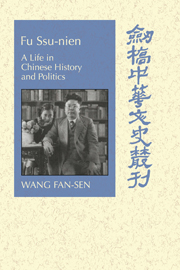Book contents
- Frontmatter
- Contents
- Acknowledgments
- List of Abbreviations
- Chronology
- Introduction: Fu Ssu-nien and Post-1895 Intellectual Trends
- 1 Fu Ssu-nien's Early Years
- 2 The Shaping of a New Historical School
- 3 Toward a Theory of Plural Origins of Chinese Civilization: Hypotheses on Ancient Chinese History
- 4 Contra-Introspective Moral Philosophy
- 5 The Burden of the May Fourth Mentality
- 6 Statism and the Later Days of a May Fourth Youth
- Conclusion: The Defeat of a May Fourth Youth
- Appendix I A Fragment from a Short Story Attacking Ku Chieh-kang
- Appendix II A Transcript of a Conversation between Fu Ssu-nien and Ch'en Pu-lei
- Glossary
- Bibliography
- Index
Appendix II - A Transcript of a Conversation between Fu Ssu-nien and Ch'en Pu-lei
Published online by Cambridge University Press: 01 February 2010
- Frontmatter
- Contents
- Acknowledgments
- List of Abbreviations
- Chronology
- Introduction: Fu Ssu-nien and Post-1895 Intellectual Trends
- 1 Fu Ssu-nien's Early Years
- 2 The Shaping of a New Historical School
- 3 Toward a Theory of Plural Origins of Chinese Civilization: Hypotheses on Ancient Chinese History
- 4 Contra-Introspective Moral Philosophy
- 5 The Burden of the May Fourth Mentality
- 6 Statism and the Later Days of a May Fourth Youth
- Conclusion: The Defeat of a May Fourth Youth
- Appendix I A Fragment from a Short Story Attacking Ku Chieh-kang
- Appendix II A Transcript of a Conversation between Fu Ssu-nien and Ch'en Pu-lei
- Glossary
- Bibliography
- Index
Summary
The following is a transcript of a conversation between Fu Ssu-nien and Ch'en Pu-lei, then Chiang Kai-shek's chief of staff, during a session of the Political Consultative Conference in Nanking in 1945 in which the character of Chiang Kai-shek was discussed.
Fu: [Recently] Mr. Chiang exhorted the citizens of Shanghai to understand fully propriety and duty, to have a sense of frugality and shame, to be responsible, and to observe discipline [ming li i, chih lien ch'ih]. These are admonitions that the nation's highest leader should make to bureaucrats, not to the common citizens.
Ch'en: I agree with most of what you say. Mr. Chiang always speaks as if he were a teacher. He imagines that the audiences to which he speaks are composed of students, not officials or common people. I advised him on this before, but he read my comments without much interest. He is aware [of this], but he does not put [this awareness] into practice. For example, he often says “compare duty with performance,” but his attention is always limited to the organs responsible for accessing and scrutinizing government organs. Although he has often said “due rewards and punishments will be meted out without fail,” he seldom punishes people and often rewards in excess. […]
- Type
- Chapter
- Information
- Fu Ssu-nienA Life in Chinese History and Politics, pp. 207 - 208Publisher: Cambridge University PressPrint publication year: 2000

